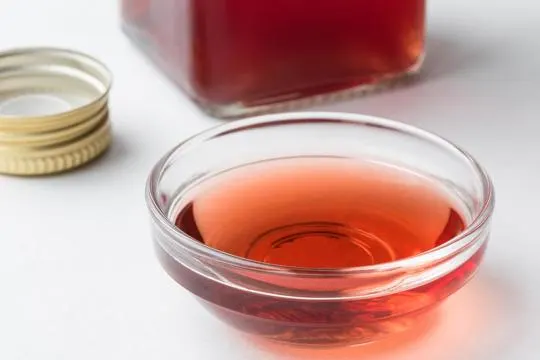Summary of key points
The main difference between red wine and red wine vinegar lies in the process of fermentation. Red wine is made by fermenting grapes, while red wine vinegar is made from fermented red wine. This results in different flavors – red wine has a fruity and tannic taste, while red wine vinegar is more acidic with a tangy flavor. Additionally, they are used differently in cooking – red wine is typically used to add depth and flavor to dishes, while red wine vinegar is used for marinades, dressings, and pickling. Ultimately, both options offer unique flavors that can enhance your dishes in different ways.
Red wine and red wine vinegar share more than just color. They’re from the same family, yet one’s for sipping and the other for splashing over salads. We’ve all been there, standing in the kitchen, bottle in each hand, puzzled.
One’s a dinner date dream, the other, a salad’s best friend. Ever grabbed the wrong one? We have. Oops.
They start the same, yet end up worlds apart. How? It’s all about the fermentation process.
Stick with us as we dive into the nitty-gritty of these two kitchen staples.
What is Red Wine?

Red wine is a popular alcoholic beverage.
It’s made from fermented dark grapes, giving it a complex flavor profile.
Notes of fruits, spices, and earthy tones can vary depending on the grape and winemaking techniques.
People enjoy it for its ability to complement meals and provide a pleasurable experience.
The production of red wine is done by crushing and fermenting grapes.
This turns the natural sugars into alcohol.
The process can take weeks to months, allowing the flavors and tannins to develop.
Aging in oak barrels or stainless steel tanks enhances the flavors and adds complexity.
Red wine has health benefits when consumed in moderation.
Substances like resveratrol help reduce the risk of heart disease and cancer.
The alcohol content also has potential health benefits, if consumed responsibly.
You can also enjoy red wine in cooking and marinating meat.
Its acidity and flavor profile add depth and complexity to dishes.
In conclusion, red wine is versatile. It has rich flavors, health benefits, and culinary uses.
Whether you sip it alone or add it to recipes, it adds sophistication and enjoyment.
What is Red Wine Vinegar?

Red wine vinegar is a special type of vinegar.
Its flavor is distinct with a hint of sweetness and acidity.
This happens when the red wine ferments, converting alcohol into acetic acid.
People often use it for cooking, like in dressings, marinades, and pickling.
Its tangy and robust taste adds depth to many dishes.
Red wine vinegar is not only tasty, but also healthy.
It contains antioxidants such as resveratrol which bring many benefits.
These antioxidants protect cells from damage from free radicals.
It can also help digestion and blood sugar control.
Red wine and red wine vinegar may seem similar, but they are different.
Red wine contains alcohol, while in red wine vinegar, the alcohol has been transformed into acetic acid.
Red wine has a rich flavor and alcohol, while red wine vinegar’s strength is its acidic qualities and taste.
Differences Between Red Wine and Red Wine Vinegar

Red wine and red wine vinegar may look similar, but they are very different.
Source and Production
When it comes to understanding the differences between red wine and red wine vinegar, source and production play a crucial role.
Let’s explore the characteristics that set these two apart.
Red wine and red wine vinegar both come from grapes, but the types used are different.
Red wine is made by extracting juice from red or purple grapes such as Cabernet Sauvignon or Merlot.
Red wine vinegar is produced by fermenting red wine with bacteria called Acetobacter which converts the alcohol into acetic acid.
Red wine production is simple: harvest and crush the grapes, then ferment with yeast.
The time taken varies depending on the type of grapes and desired taste.
After fermentation, the wine is aged in barrels or bottles before bottling.
Making red wine vinegar is a more complex process.
First, a batch of red wine is made.
Then, it is exposed to oxygen and Acetobacter bacteria to convert the alcohol into acetic acid.
This creates the sour flavor of vinegar.
In short, source and production methods give red wine and red wine vinegar their unique properties.
From a glass of red wine to the tangy notes of red wine vinegar, these culinary items are perfect for any gastronomic journey.
So, take a sip, savor, and experiment to enjoy the potential of these grape-derived delicacies.
Acidity Level and Flavor
Red wine and red wine vinegar have distinct differences when it comes to acidity level and flavor.
Red wine has robust, complex flavors ranging from fruity to earthy.
In contrast, red wine vinegar has a tart and tangy taste with more pronounced acidity.
Red wine usually has lower acidity than red wine vinegar.
That’s because in the fermentation process for red wine, sugar converts to alcohol, reducing acidity.
But red wine vinegar has an extra fermentation process which turns alcohol into acetic acid, giving it its sharpness.
These varying levels of acidity affect their uses in cooking.
Red wine is used in sauces, marinades, and braising liquids to enhance flavors without overpowering them.
Red wine vinegar is prized for adding brightness and balance to dressings, pickled vegetables, and as a final touch on dishes.
Uses in Cooking and Culinary Applications
Uses in Cooking and Culinary Applications:
Wine has been cherished for many years for its uses in cooking.
It can range from adding flavor to being the key component of a sauce or marinade.
Red wine has multiple culinary applications, making it a staple for both home cooks and professional chefs.
Not only does red wine bring a rich flavor, but its acidity helps to soften meat and give dressings and sauces a tangy twist.
It’s perfect for deglazing pans and adding depth to soups and stews.
From classic dishes to modern creations, red wine is an essential ingredient.
However, red wine vinegar is different from regular red wine.
After a secondary fermentation process, alcohol turns into acetic acid, giving the vinegar a sharper and more acidic taste.
This acidity makes red wine vinegar a great dressing or marinade.
It pairs well with bold flavors like garlic, mustard, and herbs.
It can also be used as a condiment or as an ingredient in braises and slow-cooked dishes.
Although both red wine and red wine vinegar can sometimes be used interchangeably in recipes, their flavor profiles differ due to differences in acidity and sweetness.
Alcohol Content
Red wine and red wine vinegar have similar colors. However, alcohol content is different.
Red wine usually has 12-15% alcohol. Red wine vinegar has almost no alcohol.
It’s made by fermentation of wine into acetic acid.
Red wine is enjoyed for its flavor and effects.
Red wine vinegar is used in cooking or dressing salads. Note this difference.
Similarities Between Red Wine and Red Wine Vinegar

Red wine and red wine vinegar may appear similar, but they differ in terms of how they’re made.
Red wine is fermented grape juice, while red wine vinegar is created by fermenting red wine into acetic acid.
Taste-wise, both are acidic. Red wine has a fruity flavor plus tannins and alcohol.
Red wine vinegar tastes sharper, due to the acetic acid.
Cooking-wise, they both offer different uses.
Red wine is great for spicing up sauces and stews, while red wine vinegar is ideal for dressings, marinades, and pickling.
Health-wise, red wine has resveratrol to help protect against certain diseases.
Red wine vinegar may help reduce blood sugar and aid digestion.
Culinary Uses for Red Wine and Red Wine Vinegar

Red wine and red wine vinegar have different culinary purposes.
Red wine can be used in cooking to add flavor to foods such as stews, sauces, and marinades.
It can also enhance the taste of vegetables, meats, and even desserts.
On the other hand, red wine vinegar is mostly used as a condiment or a dressing.
It is tangy and acidic, making it ideal for salads, pickled vegetables, and marinades.
In addition to their traditional applications, both red wine and red wine vinegar can boost a variety of dishes.
Red wine can be reduced to create a tasty sauce or glaze.
Red wine vinegar, on the other hand, can add a bright contrast to creamy or fatty dishes.
Moreover, both red wine and red wine vinegar are beneficial for health when taken in moderation.
Red wine contains antioxidants that benefit heart health.
Red wine vinegar also helps improve digestion and blood sugar control.
In conclusion, whether you choose to use red wine or red wine vinegar depends on what flavor you want to achieve.
Red wine adds richness and depth, while red wine vinegar offers acidity and tanginess.
Both ingredients can bring a variety of flavors to your cooking.
So try them out and see what incredible dishes you can create.
Nutritional Value and Health Benefits
Red wine and red wine vinegar have similar flavors.
However, they differ in terms of nutrition and health benefits.
Red wine contains antioxidants like resveratrol.
These can help the heart and reduce inflammation.
Red wine vinegar has acetic acid. This acid may help digestion and blood sugar levels.
Both can be enjoyed in moderation for their health benefits.
But too much of either can be bad for you.
Red Wine vs Red Wine Vinegar: Which to Use When?
Red wine and red wine vinegar may seem alike, but they have distinct differences that make them good for different uses.
Red wine is a beloved alcoholic drink made from fermented grapes, and red wine vinegar is a tart and acidic liquid made by fermenting red wine.
Both have exclusive flavors and features that can improve various dishes and recipes.
When cooking, red wine is often used to give depth and complexity to sauces, stews, and marinades.
It can bring out the richness of ingredients and create a flavorful flavor profile.
Plus, the blend of alcohol and fruity notes in red wine adds an exclusive dimension to recipes such as beef bourguignon or coq au vin.
Its complex flavors can also go well with game meats and hearty vegetables.
On the other hand, red wine vinegar is usually used in salad dressings, vinaigrettes, and pickling recipes.
Its tangy taste and acidic nature give a contrast to the sweetness of fruits or the creaminess of dressings.
Red wine vinegar’s acidity can also act as a tenderizer for meat or give a bright flavor to roasted vegetables.
It’s an essential ingredient in Mediterranean cuisine.
While both red wine and red wine vinegar can be used in cooking, it’s important to pick the right one based on your desired outcome.
Red wine adds flavor complexity with its alcoholic richness, and red wine vinegar uplifts dishes with its tangy acidity – but without the alcohol content of red wine.
To sum up, red wine and red wine vinegar share similarities due to their origins from fermented grapes.
But they serve different purposes in cooking.
Red wine offers flavor complexity with its alcoholic richness, and red wine vinegar enhances dishes with its tangy acidity.
Knowing their special characteristics enables you to use them correctly in your culinary adventures.
Conclusion
With the slight chemical differences between red wine and red wine vinegar, it is no surprise that they can both be incredibly versatile ingredients to cook with.
Both are capable of adding delicious, full-bodied flavor to any dish you make; however, don’t forget that it is important to recognize and use the ingredient that works best for your specific recipe.
Not only will it bring out the flavor of each bite, but it could be the key factor in separating an average meal from a five-star dish.
As always, experiment with different combinations of flavors and come up what suits you best.
Make sure to reach for either a bottle of red wine or a jar of red wine vinegar next time you cook – you won’t regret it.

Leave a comment